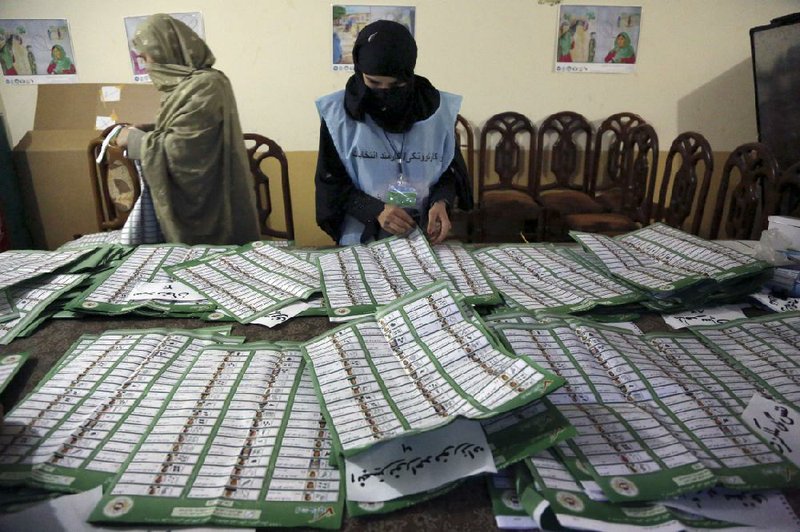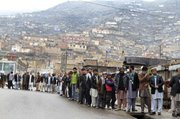KABUL, Afghanistan - Defying a campaign of Taliban violence that unleashed 39 suicide bombers in the two months before Election Day, Afghan voters on Saturday turned out in such large numbers to choose a new president and provincial councils that polling hours were extended nationwide.
RELATED ARTICLES
http://www.arkansas…">On fateful day, journalists saw little risk in Afghan triphttp://www.arkansas…">Afghan presidential candidates
Militants failed to mount a major attack anywhere in Afghanistan by the time polls closed, and voters lined up despite heavy rain and cold in the capital and elsewhere.
“Whenever there has been a new king or president, it has been accompanied by death and violence,” said Abdul Wakil Amiri, a government official who turned out early to vote at a Kabul mosque. “For the first time, we are experiencing democracy.”
After 12 years with President Hamid Karzai in power, and after decades of upheaval, coup and war, Afghans on Saturday were for the first time voting on a relatively open field of candidates.
Election officials said that by midday more than 3.5 million voters had turned out - already approaching the total for the 2009 vote. The Election Commission chairman, Mohammad Yusuf Nuristani, said the total could reach 7 million. “The enemies of Afghanistan have been defeated,” he declared.
In congratulating Afghanistan on the election, President Barack Obama said it represented “another important milestone in Afghans taking full responsibility for their country as the United States and our partners draw down our forces.”
“These elections are critical to securing Afghanistan’s democratic future, as well as continued international support, and we look to the Afghan electoral bodies to carry out their duties in the coming weeks,” Obama said in a statement.
U.S. Secretary of State John Kerry said the “vote demonstrates how committed the Afghan people are to protecting and advancing their democracy.” He added that the United States “remains ready to work with the next president of Afghanistan.”
But even as they celebrated the voter turnout, many acknowledged the long process ahead, with the potential for problems along the way.
International observers, many of whom had fled Afghanistan after a wave of attacks on foreigners during the campaign, cautioned that how the votes were tallied and reported would bear close watching.
It is likely to take at least a week before even incomplete official results are announced, and weeks more to adjudicate Election Day complaints. Some of the candidates were already filing fraud complaints Saturday.
With eight candidates in the race, the five less-heralded candidates’ shares of the vote made it more difficult for any one candidate to reach the 50 percent threshold that would allow an outright victory. A runoff vote is unlikely to take place until the end of May at the earliest.
The leading candidates going into the vote were Ashraf Ghani Ahmadzai, 64, a technocrat and former official in Karzai’s government; Abdullah Abdullah, 53, a former foreign minister who was the second-biggest vote-getter against Karzai in the 2009 election; and Zalmai Rassoul, 70, another former foreign minister.
Both Ahmadzai and Abdullah praised the vote.
“A proud day for a proud nation,” Ahmadzai said.
In general, there do not appear to be major policy differences toward the West among the front-runners.
All eight candidates also speak against fraud and corruption and vow to improve security, while they differ on other issues such as the country’s border dispute with Pakistan.
A shortage of ballots at polling places was widespread across the country by midday Saturday, and some voters were in line when polls closed.
More worrisome, the threat of violence in many rural areas had forced election authorities to close nearly 1,000 out of a planned 7,500 polling places, raising fears that a big chunk of the electorate would remain disenfranchised - though in at least some of those areas voters were able to seek more secure voting places.
However, in some districts that were still nominally open for polling, residents were too frightened by the Taliban’s threat to punish voters, too dubious about the security forces’ ability to protect them or too disenchanted with the national government to turn out to vote.
Across the country, the government closed more than 13 percent of the polling centers, zeroing in on areas where the security forces would struggle to maintain order. But the actual number of closed precincts was probably much higher.
Wardak province, for instance, reported no official poll closings. But the province is one of the most violent and forbidding in the country, and, anecdotally, turnout was reported to be low.
For the most part, the insecure provinces would contribute only a small part of the overall vote nationwide. But Nangarhar is different. In the 2009 election, more than 370,000 people voted there. Only two provinces, Kabul and Herat, produced more votes.
Back then, Nangarhar was not as violent, and the powerful governor, Gul Agha Shirzai, now a presidential contender, was able to shore up votes for Karzai. This time, without Shirzai in office and with the situation less secure, a large question mark looms over how representative the vote will be.
SCATTERED ATTACKS
Overall, when it came to attacks on Election Day, the Taliban’s threats seemed to be greatly overstated. Only one suicide bombing attempt could be confirmed - in Khost - and the bomber managed to kill only himself when the police stopped him outside a polling place.
In three scattered attacks on polling places, four voters were reported killed. Two rockets fired randomly into the city of Jalalabad wounded three civilians, none of them of voting age. One border policeman, in southern Kandahar province, and another policeman in the remote western Farah province were confirmed killed in Taliban attacks. There were reports that as many as eight Afghan Local Police members had been killed in northern Kunduz province, though authorities said Saturday evening that was false.
Interior Minister Umar Daudzai said there were 140 attacks nationwide Saturday, compared with 500 attacks recorded by the U.S. military in 2009.
In preparation for the election, the Afghan government mobilized its entire military and police forces, about 350,000 in all, backed up by 53,000 NATO coalition troops - though the Americans and their allies stayed out of it, leaving Afghans for the first time entirely in charge of securing their election.
“Voting on this day will be a slap to the faces of the terrorists,” said Rahmatullah Nabil, the acting head of the National Directorate of Security, the Afghan domestic intelligence agency.
Sensitive to concerns about potential fraud - more than 1 million ballots were thrown out in the 2009 presidential vote and then again in the 2010 parliamentary elections - the police were quick to report their efforts to crack down Saturday.
Among those arrested were four people in Khost who were caught with 1,067 voter-registration cards. Several people, including an election official, were caught trying to stuff ballot boxes in Wardak province.
Election officials expressed confidence that redoubled safeguards, including computerized bar coding of ballots, ballot boxes and voter-registration cards, as well as two kinds of indelible ink to mark voters’ fingers with (one invisible except under ultraviolet light, the other blue silver-nitrate), would help them detect other forms of fraud.
“This has been the best and most incident-free election in Afghanistan’s modern history, and it could set the precedence for a historic, peaceful transition of power in Afghanistan,” said Mohammad Fahim Sadeq, head of the Afghanistan National Participation Organization, an observer group.
Even where the Taliban managed to strike, voters still turned out afterward. A bomb set off at a polling place in Mohammad Agha district of Logar province killed two voters and wounded two others, according to the district governor, Abdul Hamid.
“The explosion dispersed the voters who were holding their voting cards and waiting to vote,” said Zalmai Stanakzai, a car-repair shop owner who was there. “Some of us left; the others stayed. I was concerned about our safety, but we considered voting our duty.”
Nicholas Haysom, the United Nations’ top election official in the country, said: “We know that the Taliban have made a very explicit and express threat to disrupt it. The failure to disrupt the elections will mean that they will have egg on their face after the elections.”
Early in the day, in a high school near the presidential palace, an emotional Karzai cast his vote for his successor.
“I, as a citizen of Afghanistan, did this with happiness and pride,” he said afterward.
Underwritten by $100 million from the U.N. and foreign donors, the election was a huge enterprise, stretching across extremely forbidding terrain. About 3,200 donkeys were pressed into service to deliver ballots to remote mountain villages, along with fleets of trucks and minibuses to 6,500 polling places in all. The U.S. military pitched in with air transport of ballots to four regional distribution centers, and to two difficult-to-reach provinces.
Although many international observers left Afghanistan in the wake of attacks on foreigners, or found themselves confined to quarters in Kabul, years of expensive preparations and training of an army of about 70,000 Afghan election observers were expected to compensate, according to Western diplomats and Afghan election officials.
“We have so many controls now; it’s going to be much safer this time,” said Noor Ahmad Noor, the spokesman for the Independent Election Commission.
The U.S. ambassador, James Cunningham, called the elections a “really historic opportunity for the people of Afghanistan to move forward with something we’ve been trying to create together with them for several years now.”
Still up in the air is the question of whether a U.S. troop force will remain in Afghanistan after 2014. Karzai’s refusal to sign a long-term security deal to allow that presence was a major point of tension between the U.S. and Afghan governments. Each of the leading candidates has agreed to sign the deal once in office.
The election Saturday was notable also for the Afghans who were taking part in it. More female candidates than ever were on provincial ballots, and two were running for vice president, the first time a woman has ever been put up for national office in the country. It has generated a great deal of enthusiasm, especially in urban areas.
Shafi Khan, 37, turned out at a high school polling place in Kabul with his three young daughters in tow, decked out in colorful outfits. In a country where men and women are often separate, especially in Khan’s native Kandahar, having the girls by his side made a statement.
“They need to understand the political process,” he said, entering the polling station with them clutching at his pants legs. “When they get bigger, they must take part.”
Information for this article was contributed by Rod Nordland, Azam Ahmed, Matthew Rosenberg, Jawad Sukhanyar and Habib Zahori of The New York Times; and by Kim Gamel, Rahim Faiez, Amir Shah and Mirwais Khan of The Associated Press.
Front Section, Pages 1 on 04/06/2014




